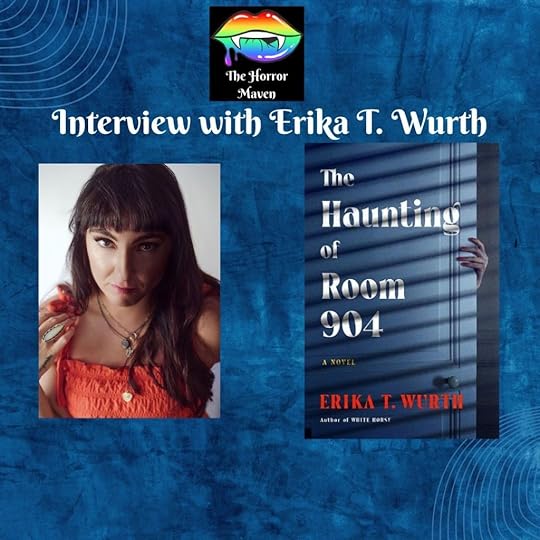Interview with Author Erika T. Wurth
Erika T. Wurth is a Native author of the new book, The Haunting of Room 904 – a book I devoured not once but twice, and I am not usually a re-reader. Her novel, White Horse, was my introduction to her work, and I immediately loved the gritty and graceful voice she brings to the horror & thriller genres. She is a local author to me, and having grown up in Colorado, I admire how she incorporates landmarks that are so iconic to Denver. This book highlights a tragedy that occurred here, referred to as “the massacre.” Erika incorporated this historical event with paranormal themes in such a searing, yet delicate, way.
I enjoyed reviewing an early copy of The Haunting of Room 904 and interviewing Erika for its release. I am excited to share our interview with you, and I hope that it inspires you to pick up not only her book but to actively read works by Native authors.

SM: It has been a long time since I found a novel so enthralling that I read it in a single evening, and your novel The Haunting of Room 904 did just that. Can you tell me what inspired you to write such a heartfelt yet heartbreaking and essential novel?
ETW: I’m so glad you found it so engaging! The plot in particular, was a bear for me with this one. As to inspiration, a lot of things were going on for me. I like to think I write for joy, primarily, but in many ways, the central themes in this novel revolve around grief and trauma. Historical trauma, regarding the massacre, and intense professional trauma—I feel that at a time in which Natives are gaining ground, there’s also a tremendous amount of violence and lateral violence when it comes to our work. I wish non-natives would check their sources, when it comes to what they’re seeing about us. I was also going through a difficult family trauma at the time, and I think that’s clear with the theme of differences and deep similarities between siblings and how that can affect one’s fundamental identity. However, I also wanted to write a novel about how ceremony can be contemporary and magical and can help us move forward in our lives.
Learning about the massacre made me so angry, first because of how horrific it was, and second because I had never heard of it before. What made you want to incorporate this specific history into your novel?
I grew up not far from where this massacre occurred (right outside of Denver)— so in many ways, it’s always on my mind. Additionally, I have a cousin whose ancestors lost relatives at that massacre. However, if folks want to read a novel that also addresses Sand Creek by someone who is Cheyenne/Arapahoe, they should read WANDERING STARS by Tommy Orange. But it felt necessary to address, and in fact disrespectful not to address something that happened so close to where I grew up and affected someone I love so much.
Being from Colorado myself, I love how you incorporated such important landmarks and chose to highlight the Brown Palace in this novel. Is there a reason you chose this landmark as the focal point of your story?
In many ways, I chose it because it’s cool. And also because I grew up not far from the Brown Palace, and have gone there for various reasons over the years. But mainly because it’s reputed to be haunted. Room 904 is supposed to be haunted by someone I very much based the character off of, a fascinating historical figure when it comes to the city of Denver—though I took much in terms of poetic license. It’s said that when there wasn’t a phone in the room, and the Brown was doing major renovations, they kept getting calls from that room. Additionally, it’s just a great Denver landmark.
By incorporating grief, trauma, and Native history that is so often ignored, your novel is an incredible tool for spreading awareness and increasing empathy. What do you hope that readers will take away from your novel?
I have to admit, I hope that people read works by Indigenous authors for more than education— for fun and joy and because the art of the thing is equal to the art of any book by any person. Because one can always read an essay about subject matter. And I don’t think I’m any different, for example, from a southern writer (of any ethnic background) who incorporates aspects of southern history into their work, which also has a deep history of grief and trauma. That said, though I very much enjoyed incorporating things like haunted mirrors, demons, and other ghostly stuff, of course Native history, specifically as relates to my ancestral line, and to Colorado, matters to me very much.
About Erika T. WurthErika T. Wurth’s novel WHITE HORSE is a New York Times editors pick, a Good Morning America buzz pick, and an Indie Next, Target book of the Month, and BOTM Pick. She is both a Kenyon and Sewanee fellow, has published in The Kenyon Review, Buzzfeed, and The Writer’s Chronicle, and is a narrative artist for the Meow Wolf Denver installation. She is an urban Native of Apache/Chickasaw/Cherokee descent. She is represented by Rebecca Friedman for books, and Dana Spector for film. She lives in Denver with her partner, step-kids and two incredibly fluffy dogs.
Please Read: https://erikatwurth.com/statement-on-identity-and-harassment/



